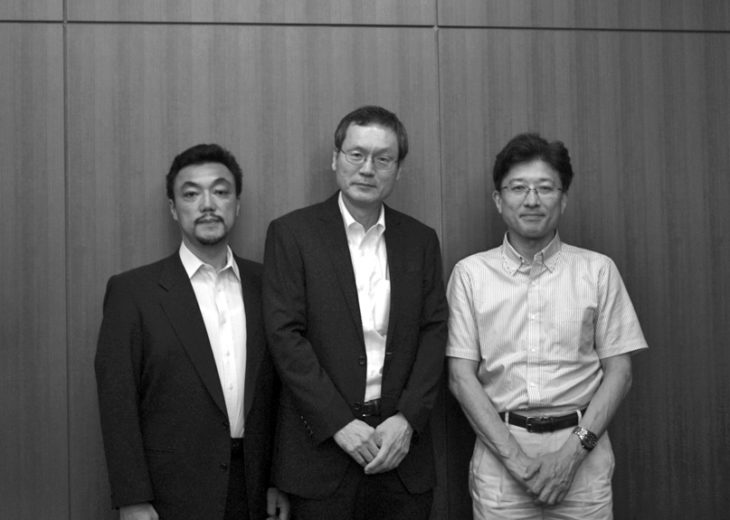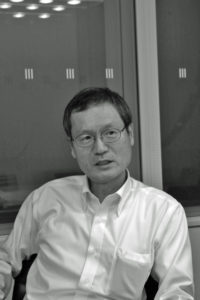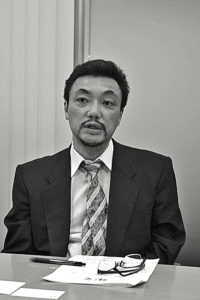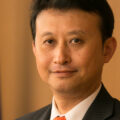Three-Man Discussion: New Frontier of Japanese Diplomacy― Diplomacy forward Africa and Expectations for the Tokyo International Conference on African Development (TICAD) VI
TICAD VI marks the first time the event has been held in Africa. The event seeks to explore the possibilities of Japan’s proprietary international cooperation and business with consideration for both the political and economic conditions, which are undergoing rapid changes at dizzying speeds, and the international conditions which can have an impact on these trends.
Discussion among Shirato Keiichi (Chief Analyst of the Middle East and Africa Office, International Information Department, Mitsui Global Strategic Studies Institute),
Endo Mitsugi (Professor, Tokyo University Graduate School of Arts and Sciences) and Fujita Junzo (Ambassador for TICAD, Ministry of Foreign Affairs)

Shirato Keiichi (left), Fujita Junzo (center) and Endo Mitsugi
Nakamura Kiichiro, Editor in Chief, Gaiko (Diplomacy): What is your opinion on the current political conditions in Africa?

Endo Mitsugi, Professor, Tokyo
University Graduate School of
Arts and Sciences
Endo Mitsugi: Considering the post-Cold War context, the time immediately after the Cold War ended in the 1990s was a major turning point for African politics. Many countries that had been run by military government or single party systems up until that time transitioned to multi-party systems.

Fujita Junzo, Ambassador for
TICAD, Ministry of Foreign
Affairs
Fujita Junzo: However, these multi-party systems and democratization didn’t necessarily bring political stability. From the 1990s to the start of the 2000s, civil wars broke out all over the continent, creating huge numbers of refugees. I can clearly remember Ogata Sadako, who was the United Nations High Commissioner for Refugees (UNHCR) at the time, making the following comment. “Tanzania is pretty much the only country we’re not seeing refugees from.”
Shirato Keiichi: During the Cold War, both the Russian and American factions competed with one another by supporting different dictators regardless of political system. Most of the countries in Africa are made up of multiple ethnic groups, and the leaders had maintained their power by distributing funds among the different races. When the support of the two factions of the Cold War, which was the source of these funds, went away, these domestic patron and client relationships could no longer be maintained, and there are many cases where this led to civil war and refugees.
Endo: I think the conditions set by donors for assistance and loans were a major factor in driving the transition to a multi-party system. There are some countries in which the democratization process proceeded smoothly from the start, some others where democratization was only achieved following a civil war, and still others where the conflict is still ongoing. But in a general sense, I think there was a trend toward stability entering into the twenty-first century.
Shirato: Even if we look at dictatorships, there are now far fewer cases like the regime of former President Taylor in Liberia (in office from 1997 to 2003) where the leaders treat their country like personal property and are rejected by the international community.
— What do you think about the rivalry between preserving the status quo and the transition to democracy?
Endo: If you look at how things really are in the local areas, not everyone is happy about democratization. For example, if we compare the political freedom and civil liberties index figures compiled by Freedom House, an international NGO, in 2005 and 2013, only 15 out of the 49 countries in Sub-Saharan Africa showed improvements, 5 of these countries were unchanged, and 29 had gotten worse. Evaluations declined in nearly 60% of the countries. In terms of governance and the rule of law, the trend seems to be reversing.

Shirato Keiichi, Chief Analyst of
the Middle East and Africa
Office, Mitsui Global Strategic
Studies Institute
Shirato: Regarding the lack of democratization progress, the flow of funds is also the same way. I discussed earlier about the flow of funds in terms of ethnic groups within the countries as single units, but at the start of the twenty-first century, the assistance money entering these countries was replaced by private investment. Since these are private investments, it would seem that business logic would apply, and these funds couldn’t be distributed for political or arbitrary purposes. However, what’s really happening is that the spouses, relatives, and people living in the same village as presidents and other powerful people are incorporating private companies that serve as shells for continuously receiving “investments.”
On the other hand, these countries are not necessarily democratic, and even if there are problems related to human rights conditions, favorable economic growth can still be achieved as in countries like Rwanda and Ethiopia. The government holds fixed development projects, economic improvement including redistribution of wealth is being performed, and the situation is reminiscent of the developmental dictatorships in Asia in the 1970s and 80s. It’s also clear that the various classes of citizens in these countries are sharing a certain amount of benefit.
Fujita: Uganda is another country that is considered stable, and is a democracy that has implemented a multi-party system. However, the presidential election held in March of this year was criticized by the Western countries. Of course there are some countries like Kenya and Tanzania where democratization is progressing relatively smoothly. On the other hand, soft targets are facing terrorist attacks, as in 2013, when a commercial facility in Nairobi was attacked by Al-Shabaab, a Somalian Islamic extremist group. From a business perspective, the factor of stability is essential.
African Context of the War on Terror
Endo: The authoritarian government of President Kagame of Rwanda is working comparatively well, and although the effectiveness of the Kagame government’s policies is one part of this, the support of the international community is also a factor. One reason for this is a phenomenon called “Genocide Credit.” Due to the guilty conscience Western nations have about overlooking the mass killings in 1994, during which 1 million people are said to have died in the course of a few months, it’s difficult for them to criticize the current regime as the government works toward rebuilding the country. The presence of a donor that provides assistance without concern for what kind of political structure is in place, China, also cannot be ignored.
Shirato: The mass killings of 1994 were a tragedy, and partly because the global interconnectedness we have now through the Internet wasn’t in place then, the leaders of the United States and other United Nations countries may have felt these events were detached from the safety of their countries and just something happening in some country far away. That sense of recognition changed completely on September 11, 2001. As a result of ignoring Afghanistan and leaving the country in anarchy for twenty years, it became a breeding ground for terrorism, and the United States was attacked. Ever since then, the “War on Terror” has been taken up as a noble cause, and both the United States and other members of the international community have started to participate proactively in these efforts. President Meles of Ethiopia strengthened his own political power by fighting alongside the United States in its proxy war to stabilize Somalia. Security in Africa has become an international problem.
Endo: The United States provides support for countries that take part in its War on Terror. Countries such as Uganda are examples of this. In these cases, democratization and governance improvement in the countries being supported are almost never considered. China isn’t the only country providing support without concern for the type of government in place. Of course the elimination of violent extremists is an important issue, but supporting countries should bear in mind that when that logic comes to the forefront too much it can halt the progress of democratization in African countries.
Fujita: It’s true in many cases that the stress on order and structure that’s developed from the War on Terror has a conflicting relationship with the progress of democratization at a certain stage. However, this shouldn’t be considered a constant. On a mid- to long-term scale, both issues can be sufficiently compatible.
Regarding the Uganda election that was referenced earlier, President Museveni was elected for the fifth time in March of this year. His administration has been running the country since 1986, and it’s clear from this longstanding term alone that his political power has a firm foundation. However, when we analyze the circumstances of the presidential election in detail, there were some districts in the capital city, Kampala, where the president was defeated by the challenger candidate. Increasing population and unemployment problems for young people contributed to this. In Uganda, the ratio of the population under the age of 28 is approximately 80% of the total, but the young people who can’t make a living in the local areas move to the cities. This young workforce is regarded as a result of the population boost when the economy is good due to foreign investment, but if this investment were to stagnate, there is a risk that it could be transformed into a source for discontent. What’s important there is private investments to keep the economy running, and at the same time, democratic political system that reflect the dissatisfaction of the people. Both are the two wheels for social stability, and even President Museveni will have to face these problems in the mid- to long-term.
Determination to Use Japan and China for Different Purposes
— Could you please share some thoughts about the economy?
Endo: According to the 2015–2016 Fiscal Year Edition of the “World Economic Outlook” issued by the International Monetary Fund (IMF), the anticipated growth rates for 2016 in Sub-Saharan Africa and the major country of Nigeria are just 3.2% and 1–2%, respectively. On the other hand, large growth rates of 7% are predicted for Ethiopia and Tanzania, countries which have been considered farming nations up until now. Some of the factors in these estimates are the declining commodity prices for resources such as crude oil and declining demand for resources as a result of the economic slowdown in China. The effect Brexit will have is unclear, but if these conditions continue, Japan and other countries taking part in resource development may be forced to reduce investigation efforts and investments. If this happens, it will have negative effects on both mid-term and long-term conditions. For this reason, there is an increasing awareness of the importance of a diversified economy and industries that aren’t dependent on resources, as well as improvement of farming productivity.
Shirato: In December of last year, at the 6th Forum on China-Africa Cooperation event, which was held in Africa, the massive scale of the support payments discussed (60 billion dollars) got a great deal of attention, but a list of the top ten fields in which efforts should be focused was also announced, and the top two were industrialization and modernization of farming. African countries have a shared awareness of danger, and the African leaders and political authorities showed a favorable response to this initiative. Unless young people are provided with sufficient work and food, they’ll be drawn into violent extremist groups, and I think this is a very serious stage in the development process for that reason.
Endo: By holding the FOCAC event every three years in a joint sponsorship system with Africa, China is proactively providing assistance for Africa’s needs. Dr. Zuma, Chairperson of the African Union Commission, has also called for a joint sponsorship system with Japan, and TICAD VI in August will be fulfilling those expectations. Of course, TICAD has a longer history, and there’s no question that FOCAC was modeled in part on TICAD. The way the two countries reference one another and compete like this is a fascinating phenomenon.
Shirato: The value Africa has for China has also changed in the past fifteen years. It all started with former colonial powers using their clout to squeeze through the cracks, enter the countries on the edges of the continent to access the interior. For example, the United States took a leadership role in oil development in Sudan, a country that had been under economic sanctions, and also provided economic assistance for Angola and Zimbabwe. China’s initial diplomacy in Africa was an effort to secure resources. Africa is also an export location for low-priced Chinese products, and at this time, China is Africa’s biggest trading partner. Also, in the future, when Africa is industrialized, I frankly think that China is considering it as a place to relocate its manufacturing facilities. As a result of a period of explosive growth that lasted nearly 20 years, China has an excessive proliferation of manufacturing equipment, and in its current economic slowdown, the issue of how to handle this is a problem China is currently facing. Africa will probably become one of China’s outlets for this excess manufacturing equipment.
Fujita: Even if China’s assistance as a whole are contributing to the economy of Africa, if we look at individual cases, there are various places experiencing friction and problems. The cheap clothing, general goods, and other products imported from China are overpowering local products, stores that stock these imports are being attacked, and hydroelectric dam construction projects remain incomplete due to a lack of technology. However, China is also learning and showing signs of change. In addition, African leaders are aware of these conditions but flexible enough to receive aid from both Japan and China and using each country for different purposes.
Endo: There are concerns that complete devotion to China alone could be dangerous, and I feel that they have increasing expectations of Japan along with that.
Fujita: Making growth in Africa an opportunity for their own country’s benefit is something countries all over the world are thinking about, and this is precisely the reason there are different development forums in competition with one another. Japan just needs to use that to its advantage.
Endo: After all, Japan can’t make a massive infrastructure investment. Just leave that to China…
Fujita: When the East African Community (EAC) built railroads, China made a massive 800 billion yen investment in Uganda alone. However, when the railroads are completed, that will provide another business chance for us. For example, they might choose to use Japanese low-friction rails. Most of all, by providing a distribution network, this railway will increase the connections Uganda, which is a landlocked country, has with neighboring nations, increasing its value as a marketplace or even as a manufacturing base. How to make use of that is up to Japan.
Views of Africa Reflected in TICAD
— Anyway, TICAD VI is finally going to be held in Kenya on August 27th and 28th.
Shirato: The first event was held in 1993, and for a development forum for like this, it’s quite well-established.
Fujita: After the end of the Cold War, interest in Africa declined suddenly within the international community. There wasn’t a large influx of funds as there had been before, and as Africa suffered from civil war and refugee problems, Japan took the initiative to hold the first TICAD in 1993 to bring back the interest of the international community in Africa. I think this was a very significant event.
Shirato: However, I think it was a struggle up until the third event (in 2003). Corporations were all indecisive…
Endo: I also often talked with a staff member at the Ministry of Foreign Affairs at that time, and Africa was considered like a global issue. Japan was fumbling around trying to discover what the continent could mean for us at that time.
Fujita: However, in terms of the form assistance should take, terms like “ownership” and “South-South Cooperation” popped up at that time, and there was increasing awareness of assistance efforts. Along these lines, the perspectives of trade and business partnerships became settled perspectives at both the fourth TICAD in 2008 and the fifth in 2013. Also, the schedule of TICAD was revised to every three years, and the TICAD VI will be held in Africa for the first time.
Shirato: Although the first TICAD was held “for the sake of Africa,” the present events are an attempt by Japan to reclaim its lost twenty years, the time of economic slowdown after the bubble period ended. TICAD has changed into a forum for encouraging Japanese companies to invest in Africa. In other words, with each iteration of the event, TICAD is becoming a “meeting for the sake of Japan” to a greater and greater extent.
Endo: To put it another way, Africa as a region has taken on a clear meaning within the scope of Japan’s diplomatic policies. These meetings are important for Africa, and have also become extremely important for Japan, and this is definitely not a bad thing. In addition, the event will be held in Africa this time, allowing Japanese companies to see the local area for themselves and have the opportunity to form partnerships. This is an important chance. It does also mean more work for the ambassador though.
Shirato: For business people, experiencing Africa for themselves is so incredibly important that the need for these opportunities is practically limitless. The parent company of my workplace is a general trading company, but there aren’t very many people who are passionate about doing business with Africa. Also, and this is true not just for trading companies but also manufacturing companies and newspaper companies as well, Africa is typically thought of as a training ground for young employees.
Endo: Mr. Shirato, how old were you when you were sent to Johannesburg as a newspaper correspondent?
Shirato: I was in my early 30s, and it was my first appointment to an overseas position. When large groups of media personnel gather to report on major incidents and elections in Africa, the Japanese reporters were all young people. On the other hand, the European reporters were almost all old veterans with twenty- or thirty-year careers in Africa.
Fujita: The same is true for companies’ staff in residence. The number of businesses with branches or offices in Africa is steadily increasing, and currently more than 400. But terms of employment there are fixed, so there’s a tendency for these employees to return to Japan before really getting established and putting down roots.
Shirato: Japanese companies are based on a lifetime employment model, and use rotation of positions on a three- to four-year cycle to develop generalists, but there is a totally different career path framework in Western countries. Long-term efforts are required to turn a profit when doing business in Africa, and Western countries have a long historical relationship with Africa and specialists working on the continent with decades of experience. Japan’s generalists have insufficient knowledge and experience with the local area, and also lack personal connections, so competing with these veterans is incredibly difficult.
Endo: However, there are some businesses, like Kaneka, makers of the Kanekalon fiber used for wigs for women and doll hair, and Saraya, makers of detergents and liquid soap products, that have achieved success in Africa.
Fujita: Sumitomo Chemical’s “Olyset Net” is also famous.
Shirato: Mozal, an aluminum smelting plant in Mozambique that the Mitsubishi Corporation contributed financing to, is another example of a business that has turned a profit. To do business in Africa, I think in the end the manager needs to be so decisive that they’re prepared for practically anything.
Endo: I think there are definitely more businesses taking an interest in Africa now. When I conducted a lecture series on Africa at the University of Tokyo, even though the attendance fees were not cheap, a fair number of business people participated, and a financial institution also asked me about political stability in Botswana. I think these companies probably had TICAD VI on their minds. TICAD probably plays a role in encouraging Japanese businesses to consider opportunities in Africa.
Fujita: It’s also only been three years since TICAD V, and on some level TICAD VI will probably be a review of TICAD V as well. On the other hand, there were some major changes in the region in the past three years. Decreasing resource prices caused economic growth in Africa to slow, the Ebola outbreak in West Africa showed more clearly how vulnerable the health and sanitation system is in the area, and the rise of Islamic extremism has destabilized society. We already discussed resource prices and Islamic extremism in the context of diversification of industry and improving farming productivity earlier, but as for Ebola, or rather medical care, health, and sanitation, there is a lot Japan can do to help. Through applications such as the use of thermography as a high-level observation monitor, Japan’s technology can contribute to solving these problems, and this will also be meaningful from a business perspective.
Shirato: For example, although a project to handle the trash and sewage produced by the rapid urbanization of Africa would depend on the extent of public financial support available, there would definitely be opportunities for Japanese companies to make use of their technological prowess.
Endo: There’s a shortage of Africa professionals in Japan, and knowledge of the local areas is precious. As a means to push businesses to take the next step forward, an all-Japan structure using networks like the Japan External Trade Organization (JETRO) and the Japan International Cooperation Agency (JICA) is absolutely essential. At the same time, I hope that businesses will recognize the value of individuals with an understanding of Africa like Japan Overseas Cooperation Volunteers (JOCVs) and people with study abroad experience, hire them for mid-career positions, and provide them with opportunities for achievement.
Africa as a “Mirror”
— In closing, please share your thoughts on Japan’s diplomatic relationship with Africa.
Fujita: Without a doubt, the fifty-four countries in Africa will become more and more important in the future. In terms of the economy, it’s a huge market of 1.1 billion people, and also a precious supply point for natural resources. Politically speaking as well, the region has a strong presence such as the “Africa votes” that have a major impact on United Nations Security Council reform. In light of these facts, the amount of exchange currently taking place in various fields cannot be considered sufficient. The only way to improve this is to build it up steadily. In that sense as well, TICAD will play a larger and larger role in the future.
Shirato: Japan is dispatching self-defense forces to the United Nations Peace-Keeping Operation (PKO) in South Sudan, and I think there will be more chances for Japan to be called upon to contribute in this way in the future. In the course of debates related to the security legislation passed last year, the focus was on the right to collective defense, and “collective security” is an important issue for discussion in the international community. Unfortunately, there were people among the constitutional protection forces in Japan that referred to aggressive use of weapons as identical to self-defense and emergency evacuation under the instruction of a UN PKO, spoke of being “anti-war,” and crushed the debate. However, the self-defense forces could be forced to open fire during a self-defense or emergency evacuation mission as PKO participants. As a member of the international community working to build peace, this is a problem that must be faced. In addition, since there is a lot of conflict ongoing in Africa, there’s a strong possibility that’s where it will happen. As a result, Africa will probably become a new frontier for Japanese diplomacy.
Endo: Just as you said, I agree that Africa is a new frontier for Japan in terms of political diplomacy. The method by and purpose for which we enter the area will call Japan’s diplomatic ideas and philosophy into question. In that sense, you could say that Japan’s diplomacy is like a mirror. Rising populations and food shortages, urbanization, land shortages and conflicts, resource development, economic disparity, violent extremists and gangs, none of these problems are isolated from the others, and all of them exist in a broader perspective, not limited to Africa alone. These problems link the world and all of our daily lives together. Including this awareness, the way that Japan works to take on these problems (or avoids them) has a double-sided relationship with the question of what kind of country Japan is. In considering this meaning as well, Africa is an incredibly important region.
Translated from “Teidan: Nihon Gaiko no Furontia ni Kogidasu ― TICAD VI to Afurika Gaiko (Three-Man Discussion: New Frontier of Japanese Diplomacy ― Diplomacy forward Africa and Expectations for the Tokyo International Conference on African Development [TICAD] VI),” Gaiko (Diplomacy), Vol. 38, Jul. 2016, 26–37. (Courtesy of Toshi Shuppan) [July 2016]




